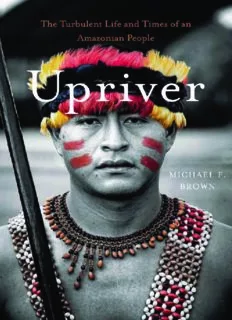
Upriver: The Turbulent Life and Times of an Amazonian People PDF
Preview Upriver: The Turbulent Life and Times of an Amazonian People
Upriver Upriver The Turbulent Life and Times of an Amazonian People Michael F. Brown Cambridge, Massachusetts & London, En gland 2014 Copyright © 2014 by the President and Fellows of Harvard College All rights reserved Printed in the United States of America First printing Library of Congress Cataloging- in- Publication Data Brown, Michael F. (Michael Fobes), 1950– Upriver : the turbulent life and times of an Amazonian people / Michael F. Brown. pages cm Includes bibliographical references and index. ISBN 978-0-674-36807-1 (alk. paper) 1. Indians of South America—Peru—Amazonas—Social conditions. 2. Indians of South America—Peru—Amazonas— Social life and customs. 3. Indians of South America—Peru— Amazonas—Folklore. 4. Amazonas (Peru)—Social conditions. 5. Amazonas (Peru)—Social life and customs. I. Title. F3429.1.A3B76 2014 306.0985'46—dc23 2014004981 Contents A Note to Readers vii Introduction 1 Part One 1976– 1978 1 Andean Prelude 19 2 Armadillo for Breakfast 39 3 Puzzle Pieces 71 4 Jesus versus the Warrior Spirits 99 5 Four Weddings and a Funeral 122 6 Trouble in Mind 151 7 Hard Lessons 182 Part Two 1980– 2012 8 Civilization’s Twisting Road 207 9 Boundary Condition 237 10 Looking Back 269 Notes 281 Sources on the Awajún and Related Societies 305 Ac know ledg ments 311 Index 315 A Note to Readers Spelling of words in the Awajún (Aguaruna) language follows the orthography developed by missionary linguists from SIL International and now used by thousands of literate Awajún. In general, pronunciation is consistent with Spanish. The letter j, for example, is pronounced like the En glish h; Awajún, therefore, is pronounced like “Awahoon.” The letter e, however, represents a midcentral vowel closer to the u in the En glish “put” than to the Spanish e; the Awajún g approximates the ng of the En glish “ring.” For the con ve nience of readers, I have included stress accents in most Awajún personal names even though the Awajún use them only when required by Spanish writing conventions. Unless otherwise noted, all translations of Awajún and Spanish texts are mine. Most Peruvians follow the Iberian practice of using both their father’s and mother’s surnames in formal settings. To avoid confusing English-s peaking readers, I normally use only the fi rst (patrilineal) surname in the main text. Following standard practice in anthropology, a handful of personal names have been changed to protect individuals whose stories might cause embarrassment or expose them to harm. Upriver
Description: